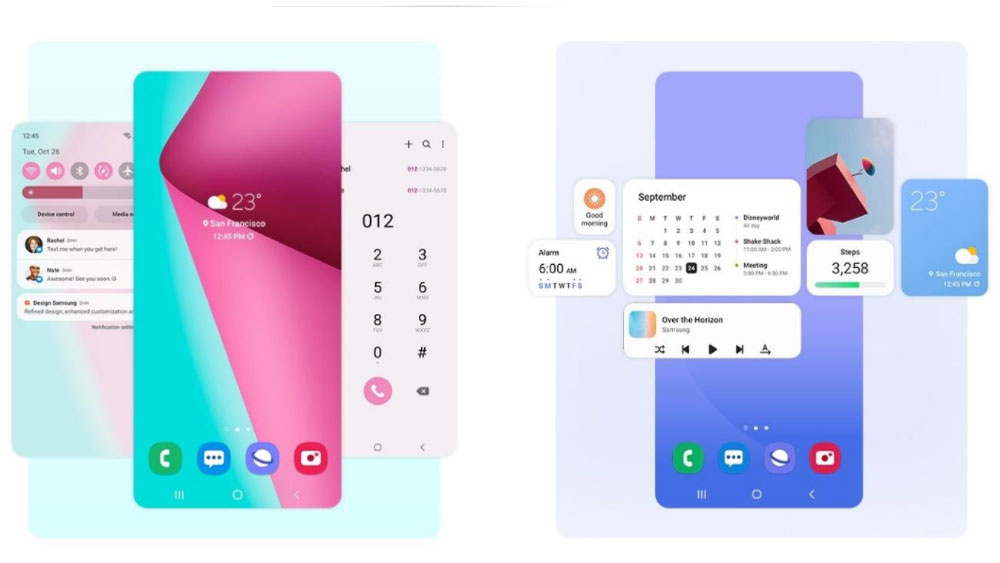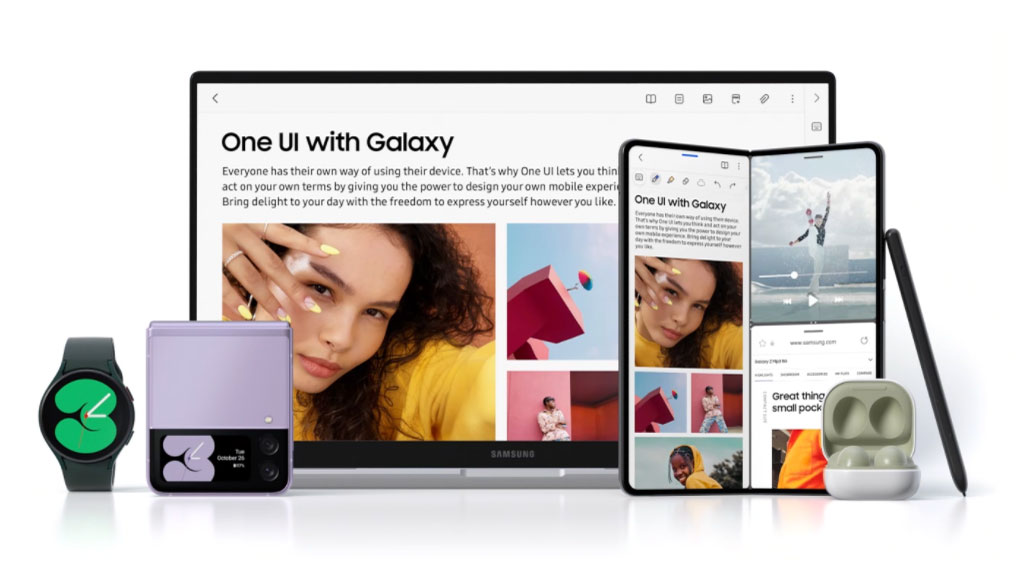Samsung’s new One UI 4 is here for Galaxy S21, expect Material You-like design changes

Samsung’s own version of Android 12 - that’s One UI 4 - is now available on the company’s top-end smartphones bringing design changes, extra privacy features and a variety of tweaks to your smartphone’s software.
If you own a modern Samsung phone, you’ll likely be able to download this software in the near future. The company is bringing the update to the Samsung Galaxy S21, Galaxy S21 Plus and Galaxy S21 Ultra at first and it'll be following for other devices in the coming months.
Android 12 has been rolling out since September 2021, but Samsung has taken some extra time to get its One UI 4 software together for a full release.
So when is it coming?
Those with the Galaxy S21 series will begin to be able to get the software from today, but this doesn't neccessarily mean it'll be immediately available for you.
Sally Hyesoon Jeong, Head of Framework R&D at Samsung told TechRadar, “The wait will not be too long. It will be with you soon, but it can be different carrier by carrier.”
New Android updates take a more staggered approach than other platforms – iOS updates are available for every compatible iPhone on the same day – and carrier integration makes this process longer as well.
The big design change
So what does One UI 4 change, and why does Samsung think this new update matters?
Jeong said, “When we think about the history of one UI, in the beginning we mostly focused on style that is quite visible and the specific features that can be used very actively in our marketing campaign.
“But as we evolved, we’ve focused less on the technical side of the software and we focus more on the experience of the features and functionalities that were used most frequently by the users.
“One UI has now become something that wraps around the software that enables most frequently used features to offer greater comfort, productivity and value to our users.”

Samsung’s One UI 4 brings with it the company’s own attempt to embrace Google’s Material You design that debuted within Android 12. The Android 12 upgrade’s headline feature is its design changes, and Samsung has taken some of these tweaks and adapted them into its own style.
For example, you can now change the color of the user interface on menus around the phone by switching the wallpaper, and other visual aspects will be subtly tweaked in turn. If your wallpaper features a bright orange color, for example, this may be used as a signature color throughout the user interface of your phone.
Samsung believes it embraced customization before Android pushed this, so this is just the company working harder in an area that it had already been exploring.
“Ultimately, customization and personalization is an undeniable mega trend”, says Jeong.
“Android started to emphasise this, and Samsung woke up to the value of customisation even before Android started to emphasise on that element. We have introduced the Theme service and other customizable features.”
It isn’t just software where Samsung is embracing customization, either. The company has recently introduced its Galaxy Z Flip 3 Bespoke Edition, which allows users to switch the look of their smartphone with different colors and designs.
More emoji
Self expression is an element that Samsung also wanted to focus on with its latest release. With the Covid-19 pandemic, Samsung believes many younger people have had to stay at home for longer periods of time.
Hyun Kim, Head of Core UX at Samsung Mobile, said, “Younger users have a strong yearning for self-expression.
“They want to express their voices and their opinions, particularly because they’ve had to stay at home longer, so the need to use mobile phones as a channel for self-expression of emotions and personality have become even greater.
“So we’ve introduced new features regarding emoji and keyboard to let them express their emotions more smoothly. And we also wanted to give them features to express their style, through color palette, and other other customizable features regarding color.”
Samsung has introduced new keyboard features such as further emoji stickers and animated emojis. There’s also third-party integration support in the keyboard now, which allows you to plugin services such as Grammarly into the software.
Foldable owners shouldn’t have long to wait

The company has made a big push for its foldable phones this year with the Samsung Galaxy Z Fold 3 and Samsung Galaxy Z Flip 3, but the introduction of multiple form factors is making the release of the company’s own software more difficult than it has been in the past.
The company has been running a beta of One UI 4 for its foldable devices in 2021, and it seems the company will be releasing the final software in a more timely fashion than it has done in previous iterations, when foldable-specific versions took longer to release than the main One UI updates.
Jeong told TechRadar, “Last year, when One UI 3 was released, foldable users had to wait a little bit before they could enjoy the latest version.
“We heard feedback, and they wanted to get their hands on One UI as soon as possible. So this time around, we tried our best to narrow the gap.
“We brought greater efficiency to the software structure by bringing a modular structure to the underlying software architecture. Through that, we were able to bring One UI to foldable users earlier than before.”
We still don’t have a firm date of when foldable devices can expect One UI 4, but from Samsung’s wording here it sounds like it won’t be far behind its more traditional phones.
Samsung has confirmed compatibility for the Galaxy Z Fold 3, Galaxy Z Flip 3, Galaxy S20, Galaxy S20 Plus, Galaxy S20 Ultra, Galaxy S20 FE, Note 20, Note 20 Ultra, Galaxy S10, Galaxy S10e, Galaxy S10 Plus, Note 10, Note 10 Plus, Galaxy Fold, Galaxy A82 5G, A72, A52, A52 5G, A52s 5G, A42 5G, Galaxy Tab S7 and Galaxy Tab S7 Plus.
from TechRadar - All the latest technology news https://ift.tt/3cd2MNR

Post a Comment